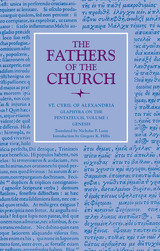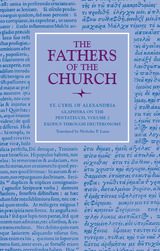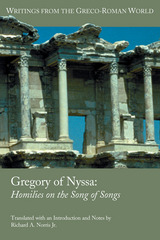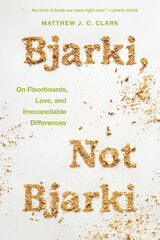127 books about Commentaries and 4
start with G
127 books about Commentaries and 4
127 books about Commentaries
4 start with G start with G
4 start with G start with G

Glaphyra on the Pentateuch, Volume 1
Nicholas P. St. Cyril of Alexandria
Catholic University of America Press, 2019
Cyril of Alexandria (ca. 376–444) is best known for his defense of orthodoxy at the time of the Nestorian controversy over the nature of Christ. However, by far the larger part of Cyril’s literary output consisted of commentaries on books of both Old and New Testaments, written before the Christological debate was sparked off in 428. One of these works, of major proportions, was the so-called Glaphyra (“elegant comments”) on the Pentateuch. This comprises a total of thirteen separate “books,” or volumes: seven on Genesis, three on Exodus, and one each on Leviticus, Numbers and Deuteronomy. The comments primarily concern the narrative portions of the Pentateuch, hence the greater space given to Genesis, though a number of the legal prescriptions are also treated. This present volume, containing all seven books on Genesis, is the first of a projected two-volume set which will offer a translation of the whole Glaphyra for the first time in English. Cyril’s aims within the commentary are both theological and pastoral. His chosen method begins with a consideration of the historia. Here the Alexandrian patriarch deals with the text at the literal level. At this stage he explains any historical, cultural, and at times even linguistic and textual issues presented within the passage, which is then followed by some theological instruction or lessons of a more practical nature based upon the literal interpretation. The exposition then moves on to the theoria. This is Cyril’s preferred term for the contemplation of the spiritual sense, that is to say, the mystery of Christ which he firmly held lay hidden beneath the surface of the Old Testament text. With great adeptness and consistency Cyril identifies elements within the ancient narratives as figures, or “types and shadows,” of the Lord Jesus Christ, the Church, and the teachings of the gospel.
[more]

Glaphyra on the Pentateuch, Volume 2
St. Cyril of Alexandria
Catholic University of America Press, 2019
The translation of the commentary of Cyril of Alexandria (ca. 376-444) on the Pentateuch, known as the Glaphyra, or “elegant comments,” is now completed by this second volume. Volume 1 contained the whole of his remarks on Genesis, and now Volume 2 presents his comments on Exodus, Leviticus, Numbers, and Deuteronomy, along with indices for the entire work. At this early stage in his patriarchate Cyril was an avid expositor of Scripture, on books of both Testaments, possibly undertaking this work as a model and guide for the clergy under his direction. While Cyril’s other large-scale commentaries on Old Testament books, such as Isaiah and the Minor Prophets (the latter commentary also published in translation by CUA Press), followed a verse-by-verse approach, the Glaphyra is more thematic. As Cyril works through the narrative passages of the Pentateuch, he pauses to explain those elements within the text that present possible difficulties or admit alternative interpretations, and invariably concludes each section by bringing out spiritual lessons of benefit to the congregation. Many of these latter relate to Christ, since, for Cyril, a Christological reading of the Old Testament was unavoidable. While in the Glaphyra it was not Cyril’s purpose to tackle the legal passages within the Pentateuch, a task that he wished to reserve for a separate work of an entirely different character (De adoratione et cultu in spiritu et veritate, “Concerning Worship and Service in Spirit and in Truth”), he does nevertheless here depart from his own remit on occasion and deal with some of the more prominent ceremonial passages. Cyril gives considerable space, for example, to the sacrifice of the Passover lamb and the levitical ritual for the cleansing of the leper, among others. As with Volume 1, Cyril’s treatment of these books is published here for the first time in English translation.
[more]

Gregory of Nyssa
Homilies on the Song of Songs
Richard A. Norris Jr.
SBL Press, 2012
Gregory of Nyssa’s fifteen Homilies on the Song of Songs offer an important resource for the history of Christian biblical exegesis, as well as for the history of Christian ascetical and spiritual teaching, and stand alongside Origen’s commentary on the Song as a source for the later interpretative tradition. In addition to offering the original text and an English translation of all fifteen homilies, Norris provides an analysis of the characteristic themes of Gregory’s ascetical teaching, emphasizes its connection in his mind with the institution of baptism, and stresses the degree to which Gregory sees the teaching of the Song as addressed not to a special class of believers but to any and all Christians.
[more]

Guiding to a Blessed End
Andrew of Caesarea and His Apocalypse Commentary in the Ancient Church
Eugenia Scarvelis Constantinou
Catholic University of America Press, 2013
In this interesting and insightful work, Eugenia Scarvelis Constantinou, the leading expert on Andrew of Caesarea and the first to translate his Apocalypse commentary into any modern language, identifies an exact date for the commentary and a probable recipient. Her groundbreaking book, the first ever written about Andrew, analyzes his historical milieu, education, style, methodology, theology, eschatology, and pervasive and lasting influence. She explains the direct correlation between Andrew of Caesarea and fluctuating status of the Book of Revelation in Eastern Christianity through the centuries.
[more]
READERS
Browse our collection.
PUBLISHERS
See BiblioVault's publisher services.
STUDENT SERVICES
Files for college accessibility offices.
UChicago Accessibility Resources
home | accessibility | search | about | contact us
BiblioVault ® 2001 - 2024
The University of Chicago Press









